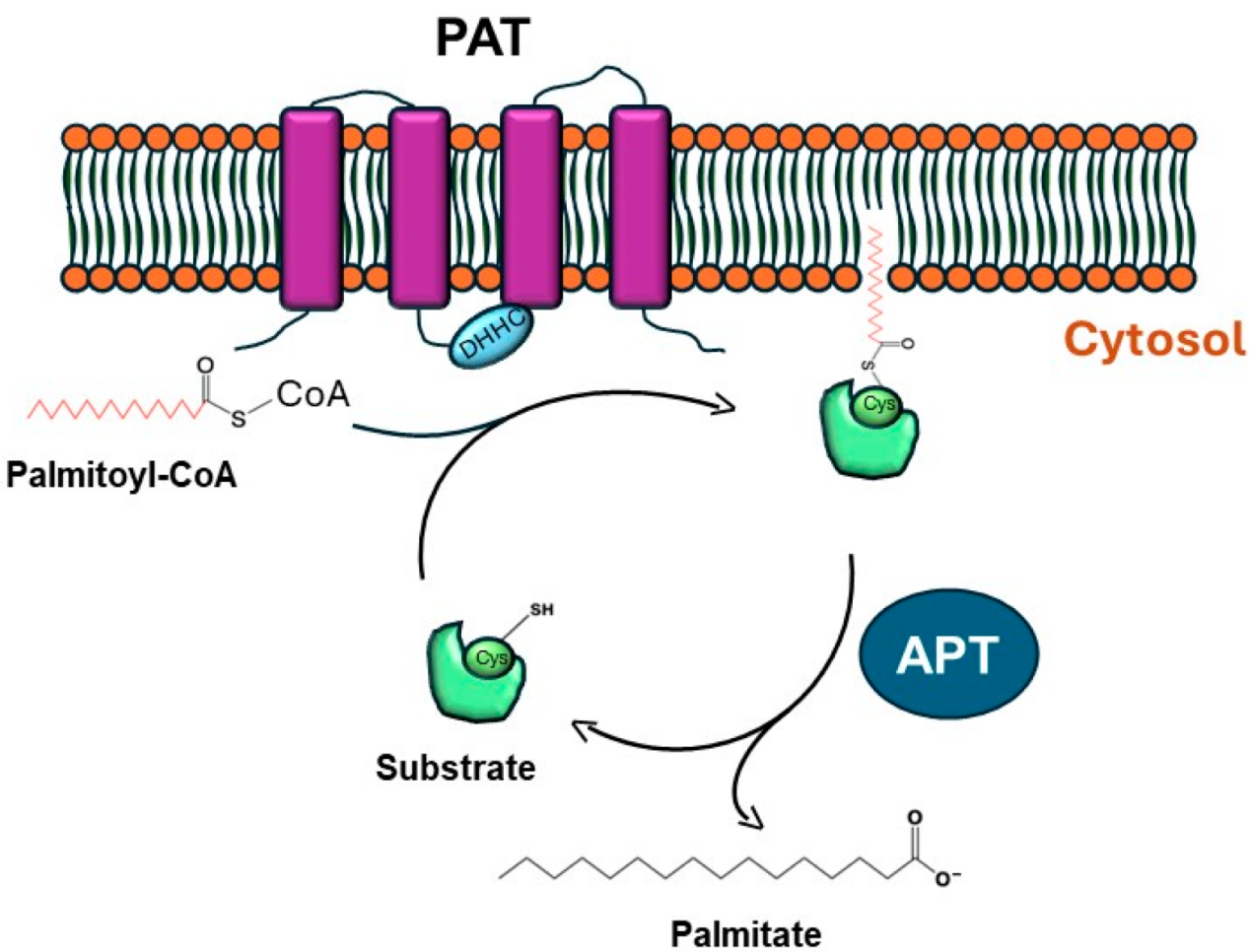S-palmitoylation Analysis Service
S-palmitoylation is a reversible lipid modification in which a 16-carbon palmitic acid molecule is covalently attached to cysteine residues through a thioester linkage. This dynamic modification acts as a regulatory switch for protein localization, membrane affinity, stability, and interaction networks. Because of its reversible nature, S-palmitoylation is uniquely suited to modulate protein functions in signaling, synaptic plasticity, immune responses, and cancer progression.
MtoZ Biolabs provides a comprehensive S-palmitoylation Analysis Service designed to deliver systematic identification, site mapping, and biological interpretation of palmitoylated proteins. By integrating optimized enrichment methods, high-resolution mass spectrometry, and advanced bioinformatics, our platform enables precise and reliable characterization of palmitoylation dynamics under various biological conditions. MtoZ Biolabs offers two analytical approaches:
1. Target Protein S-palmitoylation Analysis
This service focuses on detecting and quantifying S-palmitoylation modifications on a specific protein of interest. Using techniques such as acyl-biotin exchange (ABE), acyl-resin assisted capture (Acyl-RAC), and click chemistry labeling combined with LC-MS/MS, we accurately determine whether the target protein is palmitoylated and evaluate the modification level under different treatments or conditions. This targeted strategy is ideal for functional validation and mechanistic studies.
2. S-palmitoylation Proteomics
For large-scale discovery, MtoZ Biolabs provides proteome-wide profiling of S-palmitoylation events. Through selective enrichment of palmitoylated proteins and site-specific identification via high-resolution LC-MS/MS, this service enables global analysis of palmitoylation patterns across cell types, tissues, or experimental conditions. Bioinformatics integration further links identified proteins to signaling pathways, subcellular localization, and disease-related networks, revealing the broader biological significance of palmitoylation.
What is S-palmitoylation?
S-palmitoylation belongs to the family of protein lipid modifications, but unlike other types such as myristoylation or prenylation, it is reversible and dynamically regulated. This modification is catalyzed by palmitoyl acyltransferases (PATs), particularly the DHHC family enzymes, which mediate the attachment of palmitate to cysteine residues. Removal of the modification is performed by thioesterases, such as acyl-protein thioesterases (APTs) and palmitoyl protein thioesterases (PPTs), making the modification reversible and responsive to cellular signals.

Abdulrahman, F. A. et al. Int J Mol Sci. 2025.
Figure 1. Mechanism of PAT-mediated Protein Substrate Palmitoylation
The functional implications of S-palmitoylation are profound. It can regulate protein trafficking to membranes, modulate protein turnover by protecting against degradation, and alter interaction with other proteins or signaling complexes. Families of proteins regulated by palmitoylation include G-protein coupled receptors, ion channels, scaffolding proteins, and oncogenic signaling molecules.
Advances in proteomics have revealed thousands of palmitoylation sites across multiple species. These findings underscore its importance not only in fundamental cell biology but also in the pathology of diseases such as neurological disorders, metabolic syndromes, and cancer. Therapeutically, modulating palmitoylation enzymes or pathways is an emerging strategy in drug development.
Analysis Workflow

Sample Submission Suggestions
1. Sample Types
We accept various biological sample types, including but not limited to:
- Cultured cells
- Microorganism Samples
- Animal or human tissue
- Plant tissue
- Biological fluids such as plasma or serum
- Protein Extracts
2. Storage and Transport
- Samples should be snap-frozen in liquid nitrogen and stored at –80°C until shipment.
- Ship samples on dry ice.
- Avoid repeated freeze–thaw cycles.
*Note: If you have special sample types or require additional guidance, please contact us for personalized support before sample preparation.
Service Advantages
✔️Advanced Analytical Platforms
High-resolution LC-MS/MS instruments and optimized enrichment methods ensure high sensitivity and accuracy.
✔️Comprehensive Approach
Integration of metabolic labeling, chemical enrichment, and antibody-based validation provides a complete solution.
✔️Experienced Team
Our scientists have extensive expertise in lipid modification research, mass spectrometry, and bioinformatics interpretation.
✔️Customizable Solutions
Flexible options are available for global profiling, targeted validation, or functional interpretation depending on client needs.
✔️Rapid Turnaround
Efficient workflows allow delivery of high-quality results within project timelines.
Applications
The S-palmitoylation Analysis Service from MtoZ Biolabs supports a wide range of research applications:
- Disease mechanism studies, including neurological disorders, cancer, and immune system dysfunction.
- Biomarker discovery for diagnostics and therapeutic monitoring.
- Elucidation of signaling pathway regulation.
- Drug discovery targeting palmitoylation-dependent proteins or enzymes.
- Functional annotation of novel proteins regulated by lipid modifications.
Deliverables
1. Comprehensive Experimental Details
2. Materials, Instruments, and Methods
3. The Detailed Information of S-palmitoylation Analysis
4. Mass Spectrometry Image
5. Bioinformatics Analysis
6. Raw Data
MtoZ Biolabs combines state-of-the-art instrumentation, specialized expertise, and rigorous bioinformatics to provide researchers with actionable insights into S-palmitoylation. Contact us today to discuss your project and request a customized proposal!







